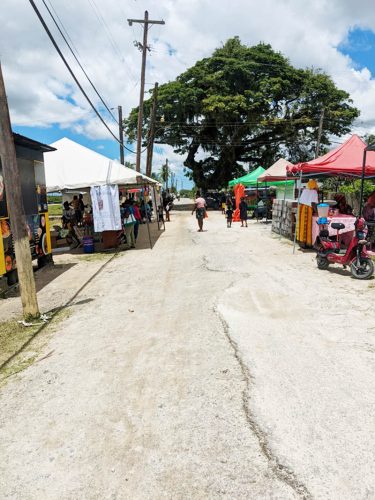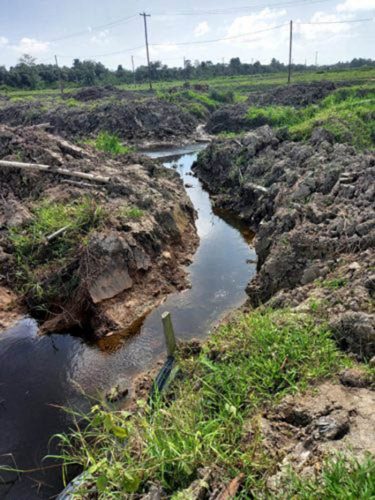After more than a year and a half of frustration attended by various forms of protest and appeals to authority designed to bring their plight to the attention of the authorities, the members of the Mocha/Arcadia Multi-Purpose Agricultural Cooperative Society whose Market Days have established a reputation as one of the best of its kind across the country, may have been offered some light at the end of a lengthy and testing tunnel.
The lands that lie contiguous to the residential community have, over time, been a source of income for those who farm it and a supplier of fresh vegetables and poultry not just the community itself but for whomsoever chooses to make their way to the Cooperative’s bustling Sunday Market.

Over time, however, the Cooperative has been struggling against hurdles that includes a seriously compromised drainage regime which leaves farms flooded, compromising livelihoods and negatively affecting the Market Day. In essence, as far as this newspaper understands, a reconfigured drainage arising out of the undertaking of wider roads and other infrastructural works had left a key drainage canal occupied by lengths of hosing which essentially
restrained the water flow resulting in the flooding of farmlands.
Jones himself has told the Stabroek Business that the authorities appeared to have struck a posture of indifference to the problem and to the attendant plight of the farmers, a view shared by other members of the community. “As with everything else you have to go to top to have any chance of getting anything done,” that resident told this newspaper.
Nor did it appear to unduly bother the authorities that official indifference to their plight had resulted to the dwindling of a valued service and a loss of Valauble income for the farmers. After all, the much talked-about Farmers’ Market had attracted patronage not just from the villages along the East Bank but from the capital as well.
The Saturday July 30 visit to the community by officials from the Ministry of Housing and Water had come only after numerous protestations and a protracted period of palpable indifference to the plight of residents and farmers alike, which, the Cooperative Society’s Chairman RaeJoburn Jones told the Stabroek Business. That had come, he said, following a period of more than one and a half years of animated meetings of the members of the cooperative society, letters to various government officials and finally, a letter to the President himself.
What Jones says he finds acutely disturbing is the fact that state agencies are, frequently inclined to respond to a problem only after there is evidence of some kind of high-level political intervention. It took just two weeks following the visit by a team of officials from the Ministry of Housing and Water for a change in the situation to occur.
It was two weeks ago, immediately after the visit by government officials ‘raised the tempo.’ Jones said that the visit was followed by the “appearance” of a team of from the Ministry of Housing and Water. It was he said, a matter of the team removing a length of drainage tubing inside the pre-existing Little Diamond Sideline Canal which takes water through Mocha Arcadia and out into the Atlantic.
According to Jones, the removal of the tubing, a measure which the Cooperative had been insisting on for some time has had an immediate impact on the problem. “Within an hour I could see a difference. The water was moving much quicker and by the next day we could see dry land in areas that had previously been under water,” Jones told the Stabroek Business. The initial phase of the remedial exercise now having been completed Jones told the Stabroek Business that the Cooperative is awaiting the realization of an undertaking given by the NDIA to assign a Long Arm excavator to facilitate the de-silting of the canal system in order to accelerate water flow.
As the residents of Mocha, more particularly the farmers, look to the authorities to complete the corrective works Jones says that the farmers have had to pay a high price for what he believes was a lack of communication between state agencies. He sites the seemingly lack of communication between the Ministry of Housing and Water and the NDIC for the creation of the problem. He says that given the NDIA’s more intimate knowledge of the drainage regime in the community, had that agency been consulted the problem may not have occurred. Meanwhile, he is recommending that mebile pumps (or permanent stations) be established at the sites of the sluices located at Mocha, Farm and Little Diamond to help remedy the flooding challenges in those communities.

Sadly, such damage as has been done seemingly largely through a lack of communication between key state agencies, cannot be undone. Jones told Stabroek Business that the frustrations associated with the problem had resulted in around 90% of the farmers who had invested considerable sums in their farms have now “walked away” from their investments. Two residents of the community with whom this newspaper spoke said that government should now give serious consideration to compensating the affected farmers. “After waiting for some time for relief from the flooding and its effects the farmers had no choice but to seek alternative employment. Some of the farmers actually invested millions of dollars from their savings. They have lost all that money.”
And according to Jones the problem of the Mocha farmers has had a knock-on effect on parts to the agro-processing community. “
The popular Market Day has also taken a ‘hit.’ Jones told Stabroek Business that in order to ensure customer retention some of the farmers at Mocha had opted supply sources for the cash crops they customarily sell to their customers.
“We are not out of the woods yet but at least it seems that there is some light at the end of the tunnel,” Joes told Stabroek Business.









